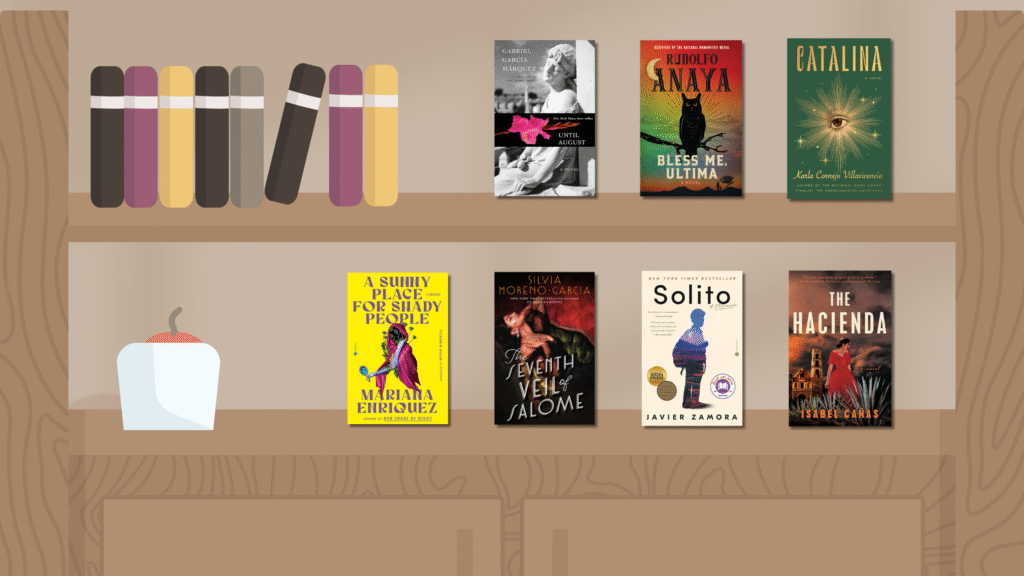
Each year, beginning September 15th, the United States honors the cultures, histories, and contributions of Americans whose ancestors, or who themselves, came from Spain, Mexico, the Caribbean, and Central and South America. At the library, we proudly join this celebration by highlighting the rich diversity and enduring influence of Hispanic and Latino communities. The start date of September 15 is significant as it marks the independence anniversaries of several Latin American countries, including Costa Rica, El Salvador, Guatemala, Honduras, and Nicaragua, followed closely by Mexico and Chile.
Throughout the month, we invite our community to explore a wide range of resources that celebrate Hispanic heritage. Join us for Spanish Storytime, visit the Spanish Language sections in our Adult and Youth collections, or stop by our main floor display that features books and media reflecting the experiences and voices of Hispanic Americans. We encourage patrons of all ages to learn more about the traditions and contributions that have shaped our shared American story.
Whether you’re discovering a new favorite book by a Latin American writer, attending a family-friendly event, or diving into the history of Hispanic activism and innovation, the library is here to support and celebrate your exploration. We hope you’ll join us in honoring this important month and take part in the vibrant, inclusive spirit that National Hispanic Heritage Month represents.
Until August by Gabriel García Márquez
A posthumously published novella about Ana Magdalena Bach, a married woman who returns each year to a Caribbean island to visit her mother’s grave, and, once a year, allows herself a passionate one-night affair with a stranger. Through these annual encounters, she confronts desire, identity, and the quiet rebellions within her seemingly ordered life.
Solito by Javier Zamora
Nine‑year‑old Javier embarks on a 3,000‑mile journey from his hometown in El Salvador through Guatemala and Mexico to reach the United States, which was supposed to take two weeks, but instead stretches into nine grueling weeks full of desert crossings, boat trips, arrests, and moments of both violence and compassion. Along the way, he forms a surrogate family with fellow travelers Patricia, Carla, and Chino who protect and support him, transforming his solitary voyage into an intimate story of resilience, solidarity, and childhood lost…and found.
A Sunny Place for Shady People by Mariana Enriquez
This haunting collection of twelve short stories blends the surreal, supernatural, and deeply unsettling, thrusting ordinary characters into encounters with ghosts, horror, urban decay, and uncanny transformations, from a riverbank of women‑turned‑birds to a hotel haunted by the drowned Elisa Lam. Enriquez’s prose is lyrical and evocative, using horror and grotesque imagery to unmask the social ills of contemporary Argentina where innocence and terror converge in macabre lyricism.
The Hacienda by Isabel Cañas
This gothic epic draws comparisons to Rebecca and Mexican Gothic, melding historical trauma, racial hierarchy, and gendered isolation into an atmospheric ghost story of power, despair, and resistance. Orphaned young mestiza Beatriz Hernández Valenzuela marries Don Rodolfo Solórzano to secure safety and status after her father’s execution in post–War of Independence Mexico, only to find his country estate, Hacienda San Isidro, haunted by violent visions, oppressive symbols, and whispers from a vengeful spirit.
The Seventh Veil of Salome by Silvia Moreno-Garcia
In 1950s Hollywood, an unknown Mexican actress named Vera Larios wins the coveted role of Salome in a lavish biblical epic, instantly drawing the envy of struggling bit-player Nancy Hartley and awakening both ambition and danger in Tinseltown’s glamorous yet ruthless milieu. Parallel to their rivalry unfolds the ancient story of Salome, creating a mythic counterpoint that reflects the ambitions, betrayals, and vulnerabilities of women across eras.
Bless Me, Ultima by Rudolfo Anaya
Young Antonio Márez navigates the spiritual and cultural tensions of 1940s New Mexico, torn between his parents’ conflicting hopes and the mysterious powers of Ultima, a curandera who comes to live with his family. As Antonio witnesses violence, death, and moral ambiguity, he begins a profound journey toward understanding identity, faith, and the nature of good and evil.
Catalina: A Novel by Karla Cornejo Villavicencio
Catalina Ituralde is a miraculously resilient undocumented student who, after surviving her parents’ fatal crash in Ecuador, was raised in Queens by her undocumented grandparents and earned a place at Harvard. In her senior year, she navigates elite campus subcultures, a precarious romance, and the looming threat of graduation, all with no legal right to stay; forcing her to question whether she can save both her family and herself.
Woman of Light: A Novel by Kali Fajardo-Anstine
Luz “Little Light” Lopez, an Indigenous‑Chicano tea‑leaf reader and laundress in 1930s Denver, is left to survive alone after her brother Diego is chased away by white supremacist violence and she begins experiencing vivid visions that transport her to her Indigenous ancestral land, known as the Lost Territory. Here she witnesses her family’s origins, triumphs, and traumas. Gifted with clairvoyance inherited through generations, Luz becomes the bearer of her family’s stories and fights to keep their history alive amid systemic racism, poverty, and erasure.
Clean by Alia Trabucco Zerán
Estela García, a housemaid originally from southern Chile, has worked for a wealthy family in Santiago for seven years, cleaning, caring for their anxious daughter Julia, and witnessing the quiet cruelties and hidden tensions inside the household. When Julia dies under mysterious circumstances, Estela, now under interrogation, breaks her long silence, recounting the carefully observed secrets, betrayals, and class divides that may explain the tragedy or conceal deeper truths.
A Long Petal of the Sea by Isabel Allende
As General Franco’s fascist forces overrun Republican Spain in the late 1930s, army doctor Victor Dalmau and the pregnant young pianist Roser Bruguera undertake a marriage of necessity to escape to France, and later board the poet Pablo Neruda’s rescue ship, the SS Winnipeg, bound for a new life in Chile. Over decades, including WWII, Pinochet’s dictatorship and exile in Venezuela, their initial bond evolves from pragmatic alliance into profound love as they forge identity, belonging, and resilience across continents and histories.
My Broken Language by Quiara Alegría Hudes
Pulitzer Prize–winning playwright Quiara Alegría Hudes recounts her coming-of-age in a vibrant Puerto Rican family in North Philadelphia, navigating the complexities of identity, language, and belonging. Through lyrical prose, she weaves together her experiences, from the spiritual practices of her mother to her academic journey at Yale and Brown, highlighting the profound influence of her heritage and the women who shaped her.
Undocumented: A Dominican Boy’s Odyssey from a Homeless Shelter to the Ivy League by Dan-el Padilla Peralta
The author chronicles his journey from arriving in the U.S. legally with his family to becoming an undocumented immigrant after their visas expired. Despite facing homelessness and systemic barriers, he excelled academically, earning a scholarship to an elite private school and later graduating as salutatorian from Princeton University, all while navigating the complexities of his undocumented status.
A Haunting in Hialeah Gardens: A Novel by Raul Palma
Hugo Contreras, a widowed Bolivian immigrant in Miami, struggles with overwhelming medical debt and works as a babaláwo—a Santería priest—despite his skepticism toward the supernatural. When his longtime debt collector, Alexi Ramirez, offers to forgive his debts in exchange for cleansing his haunted home before Christmas, Hugo reluctantly agrees, only to confront real spirits and unresolved traumas that blur the line between illusion and reality.
Sun of Blood and Ruin by Mariely Lares
Follow noblewoman Leonora de las Casas Tlazohtzin, who secretly dons the mask of Pantera—a shapeshifting, magic-wielding vigilante in sixteenth‑century New Spain—to defend her people against Spanish tyranny. As a dire prophecy foretells her early death and the collapse of the world, Leonora must embrace her heritage and choose whether to keep or surrender her legendary identity to alter her fate.

About The Author: Sarah
Sarah is an information services assistant at the Salina Public Library. She graduated from Kansas State University with a B.A. in Journalism & Mass Communication and a Masters of Arts in Teaching. Sarah also works as a 5th grade teacher when not working at the library. In her down time, Sarah enjoys being with her dogs, doing home projects, watching sports (Go Wildcats!), and learning new things. Her favorite thing about the library is the people, the patrons and her coworkers make it a great place to be at.
More posts by Sarah